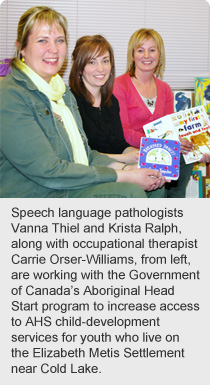
July 5, 2011
Story and photos by Mark Evans
COLD LAKE -- Parents at the Elizabeth Métis Settlement now know where to turn for advice and answers when they have concerns about their child’s speech or development.
Last September, representatives from several Alberta Health Services programs based in Cold Lake spent a day on the nearby settlement where they shared information with parents on developmental issues and how to access services available to address them.
The outreach event was planned in partnership with the Government of Canada’s Aboriginal Head Start program, which aims to enhance child development and school readiness of First Nations, Inuit and Métis children from birth to six years of age. 
The AHS-Aboriginal Head Start partnership on the Elizabeth Métis Settlement is focused on helping three- to five-year-old children succeed in kindergarten. For some children, this requires addressing some common developmental issues, such as deficiencies in speech, language and motor skills.
Over the past 10 months, Aboriginal Head Start has referred 10 children from the settlement to AHS programs in Cold Lake, compared to just three children the previous year.
“Early intervention is huge,” says AHS speech language pathologist Krista Ralph. “When it comes to treating developmental issues, the earlier the better, so when these children get to school, they have all the tools they need to excel academically and socially.”
Improving access to primary care services is one of the strategies of the 5-Year Health Action Plan, jointly developed by AHS and the Government of Alberta and supported by the 5-Year Health Funding Plan.
Organizers hope to build on this success with another outreach event this fall at the settlement, which has a population of about 800 people and is located about 45 km south of Cold Lake.
AHS occupational therapist Carrie Orser-Williams says more parents on the settlement are now taking an active role in helping their children overcome developmental issues.
“We’re empowering parents to do more stuff at home – such as reading bedtime stories – and giving them advice on what’s important to do at home and where to focus,” says Orser-Williams.
AHS is listening to the community and responding to its needs. A workshop for parents was held on the settlement this spring after they identified concerns with their children’s speech and language development.
“There’s a nice trust being built between health professionals and community members,” says AHS speech language pathologist Vanna Thiel. “We’re there often and we’re there for lots of different activities, so the parents start to trust us.”
Shelley Bartman, Director of Aboriginal Head Start on the Elizabeth Métis Settlement, says many parents on the settlement are intimidated by the idea of going to the public health centre, so providing access in the community removes that barrier.
At the outreach event, parents were provided with information about growth and development, and services available to the community, as well as bags filled with books, scissors, paper and crayons that parents could use with their kids.
“They all left with the tools in their bag,” says Bartman.
Adds Thiel: “We’ve heard comments like, ‘Oh, I didn’t know it was important to read to my children.’ I thought that was monumental because if they can make a simple change such as reading a book a night with their child, the progress will be amazing.”